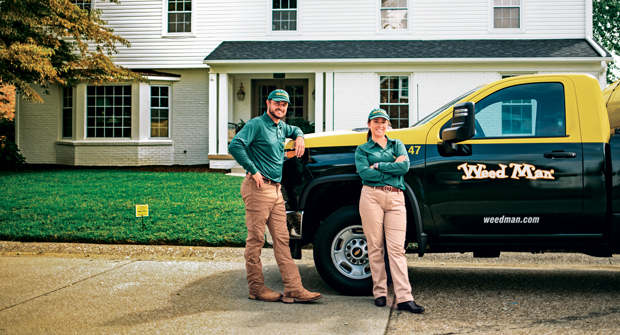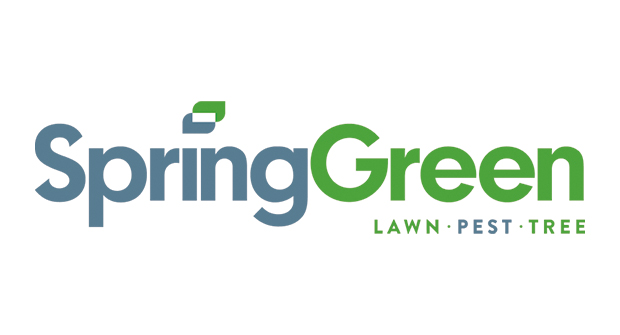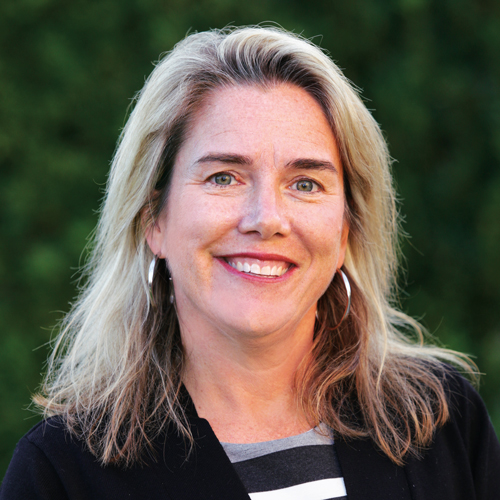
Jennifer Lemcke, CEO of Weed Man, Mosquito Hero and TurfBot, has grown up in the industry. Her father bought his first Weed Man franchise when she was a teenager. She has worked in every facet of the company, including operating her own chain of Weed Man franchises for six years.
Since 2020, Lemcke has served as the CEO of Weed Man, the No. 10 ranked company on the 2023 LM150 list, with a revenue of $308 million in 2022.
“I like to manage with my sleeves rolled up, side-by-side with the franchisees,” Lemcke tells LM. “That’s my space. I love to do that. I love to dig in if there’s an issue. I don’t like to manage from the boardroom. I love to get in there and I think that has built trust with my franchisees. It opens up communication and solidifies trust.”
Lemcke sat down with LM to discuss her expectations for 2024, what she sees happening with private equity dollars and about a surprising super-group of lawn care industry giants formed during COVID.
Landscape Management: What is your forecast for 2024 and beyond — for Weed Man and the industry as a whole?
Jennifer Lemcke: For us, we’re looking in 2024 for another double-digit growth year and that’s tough to do without doing acquisitions. We have grown organically, one customer, one franchisee and one owner at a time.
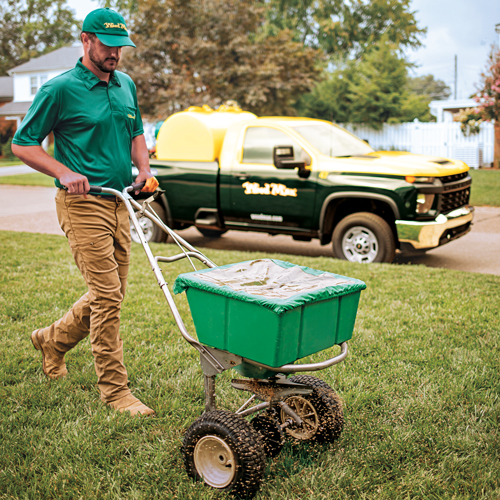
You’re seeing a lot of activity in our industry right now with private equity. They’re coming in and they’re doing large acquisitions and melding brands and melding different companies. There’s a big shake-up going on in our industry. It used to be TruGreen that was doing all the acquisitions, and Scott’s for a time. They kind of backed out of that space. We’re seeing (what it was like) back in the 1990s and 2000s with all of the acquisitions happening. I feel like you’re seeing a lot more of a competitive landscape, especially in the marketing space. The digital marketing space rubbing up against a lot of these private equities that are pumping a lot of money into it.
It’ll be interesting to see over the next five years if you’re going to have some players that are going to return to the marketplace after their noncompetes are up, and what exactly private equity is going to do inside of our industry while they’re here. We’re trying to find our space. I can’t imagine the lawn operator owner out there that’s figuring out what’s our next step and they’re trying to market their business and they’re trying to grow their business. They’ve got some pretty deep pockets to come up against.
We’re adjusting and we’re able to adjust because we just have phenomenal business owners inside of our network. We share everything and we really are able to pivot together very quickly.
LM: Do you think private equity will continue on this path for the foreseeable future? Or do you think it will slow down?
Lemcke: I’m not seeing a slowdown. Private equity has been very present in the franchising space and seems to have gotten even more active in the home services market where there’s a huge opportunity. You’re seeing anywhere where there’s an opportunity, private equity is there. You’ve got a lot more people that are aging baby boomers. You got millennials who are coming into the space and buying homes.
I think our industry is going to continue to be healthy. I think it’ll still continue to garner private equity interest. It seems like, with private equity, from what I’ve seen, and I know I’m generalizing here, it’s usually a five-year cycle. Private equity will come in, buy the companies out, put their fingerprints on it and grow the brand, really, really pump up the EBITDA and then they typically spin it off to another private equity and then there’s another three- to five-year cycle that happens.
I don’t think the headlines are quite done yet. I think we’ll see continued activity in our space and then probably in that cycle will come more different private equities that’ll come in and buy out some existing brands.
LM: Let’s talk about franchising in general … what are some questions a business owner should consider before looking into joining a franchisor?
Lemcke: Before you look at a franchise, you need to make sure it’s a good fit. Talk to others who have done it before you — whether it’s with Weed Man or another franchise system. We are very diligent with our candidates to make sure that they call other franchisees. One, there are certain things with franchising laws that we can’t disclose. Probably, at the top of my mind, how much money can I make? Well, we can’t really tell them that because they’re very strict on what we can and cannot say. But an independent Weed Man franchisee could tell them. They are very open with information.
And then when you’re becoming a franchisee, you are partnering with that brand and you need to feel comfortable. We look like a shiny new car at the beginning, but you need to talk to franchisees who have been through our new dealer training. What does that look like? What does the support look like? Are you happy with your decision?
Those are some of the key questions that franchisees would be answering negatively if it was a bad experience. We’re very blessed that we don’t have any of those and by and large, our franchisees are very happy.
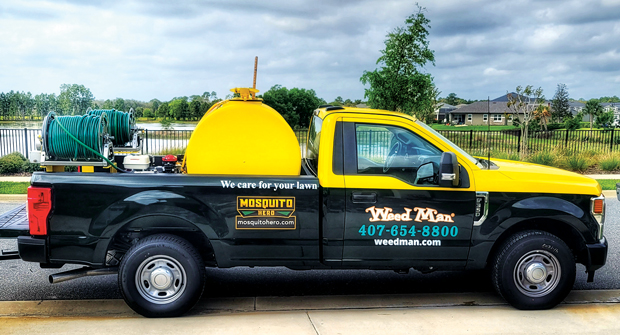
LM: Is there a right size of a business that you look for, that makes for an ideal candidate to become a franchisee?
Lemcke: Our experience has been we’ve been able to help offices or companies that were either doing landscaping and maybe dabbling in lawn care and just really hadn’t taken off that section of their business.
We’ve been able to help quite a few landscapers expand that portfolio. Or we had some landscapers, who were subbing it out and wondered, ‘Is this something that I’d like to do in-house?’ We are able to give them the systems and the tools to be able to add that service.
We’ve been very successful in doing that. We actually have had quite a few golf course superintendents who have joined us. We just seem to fit into a mid to large-size company that is looking to add systems and lawn care to its portfolio of services offered.
LM: You’ve grown up in the industry, from when your dad bought his franchise when you were 16. What is it like to have your job — do you love what you do?
Lemcke: I love the people first and foremost. I am blessed with working not only with a head office team that’s amazing, also that the average tenure is over 15 years. Some of our employees have been working with me for almost 30 years. I’m blessed to be surrounded by some incredible talent and a lot of institutional knowledge.
Second, we have partners across the U.S. that we call our sub-franchisers that really help support our franchisees. They’ve built an incredible relationship with their franchisees and with the head office. We are 100 percent in it together. I love that about my job.
LM: What advice do you have for the industry?
Lemcke: That we need to protect our industry. We need to market ourselves and get the customers and all that, but we also have to focus on protecting the industry. This goes back to why I’m now involved heavily with the NALP (National Association of Landscape Professionals) but in a different way. And it actually came through during COVID. Believe it or not, all the large competitors all work together. During COVID, we’d ask each other, ‘Are you going out? Are the trucks going out? What’s going on?’
I was on the phone with all my competitors on a regular basis and we really helped each other through a lot of tough situations and scary situations. From that, we started to meet on a monthly basis and we continue to meet on a monthly basis with Andrew Bray (senior vice president of government relations and membership, NALP) and Bob Mann (senior director of technical and regulatory affairs, NALP). It’s TruGreen, Senske, myself, Lawn Doctor and Spring Green — we meet and we talk about the industry and we want to make sure that not only do we put out fires, but also be proactive in some areas, at the state level. It’s a great meeting and we’re all friends … we rib each other. It’s a good group of folks.
I think it’s important that people understand some of the big players are very active. It may not seem like it, but we are very active in the background supporting some initiatives that are happening at the local level.
